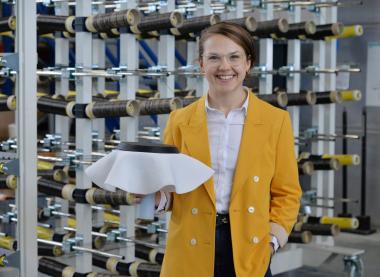Paul Schlack Prize 2025: Oil filtration with a bionic textile
On various biological surfaces, oil is adsorbed from water surfaces and transported along the leaf. In her dissertation, ITA Postdoc Dr Leonie Beek transferred this effect to a technical textile using her Bionic Oil Absorber (BOA), which can remove up to 4 litres of diesel per hour from water at technological readiness level 4. For this development, Dr Beek was awarded the Paul Schlack Prize 2025 for her dissertation ‘Bionic textiles for oil-water separation modelled on superhydrophobic biological surfaces’ on 10 September 2025. The award ceremony took place during the opening event of the Dornbirn GFC Global Fiber Congress in Austria.
Oil-water separation without additional energy or toxic substances
Dr Leonie Beek's dissertation focused on the sustainable separation of oil and water. On various biological surfaces, oil is adsorbed from water surfaces and transported along the leaf. This effect differs from technical solutions in that oil-water separation is achieved without external energy and without toxic substances.
Possible use in harbour basins or in the event of flooding/pollution of inland waters
Dr Beek integrated the bionic textile into a floating device (Bionic Oil Adsorber – BOA). The BOA demonstrator, which has a technology readiness level of 4, can remove up to 4 litres of diesel per hour. It is intended for use in port areas. Another promising application is in the event of flooding and pollution of inland waters and urban sewage treatment plants.
Ecologically and economically sustainable technology
The technology is ecologically sustainable, as both the textile and the separated oil can be reused. It is also economically sustainable, as the textile is up to 13 times cheaper than sorption materials with a service life of 21 days.
Overall, Dr Leonie Beek succeeded in her dissertation in transferring the biological principle to a bionic textile and presenting a product for use in the completely new application of oil-water separation. This is the first time that superhydrophobic surfaces have been used outside of friction reduction.
Since 1971, the Paul Schlack Prize has been awarded at the Dornbirn GFC Global Fiber Congress (formerly Dornbirn Man-made Fibers Congress) in Dornbirn (Austria) to promote chemical fibre research at universities and research institutes. Previous ITA winners of the Paul Schlack Prize include Dr Stefan Peterek, Dr Andreas De Palmenaer, Prof. Dr Gunnar Seide, Dr Wilhelm Steinmann, Dr Stephan Walter, Dr Gisa Wortberg, Dr Benjamin Weise, and Dr Markus Beckers.
Paul Schlack Man-Made Fibres Prize oil filtration RWTH Aachen, ITA, Textiltechnik bionic
ITA – Institut für Textiltechnik of RWTH Aachen University






